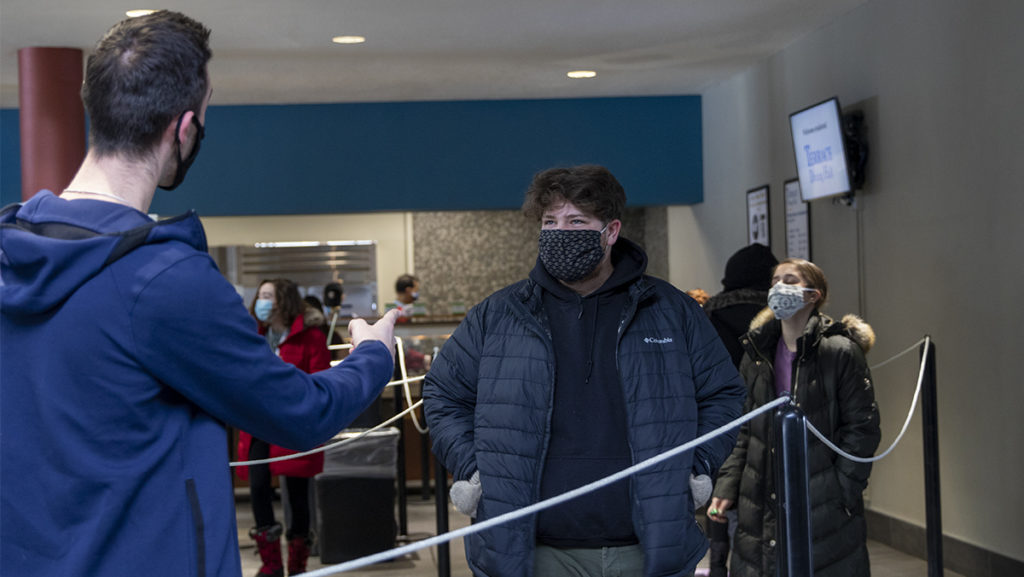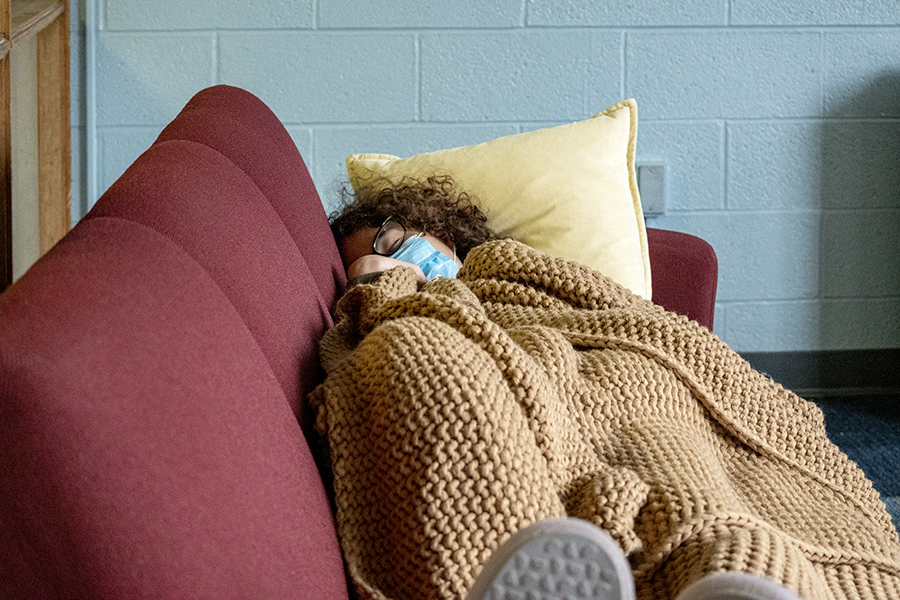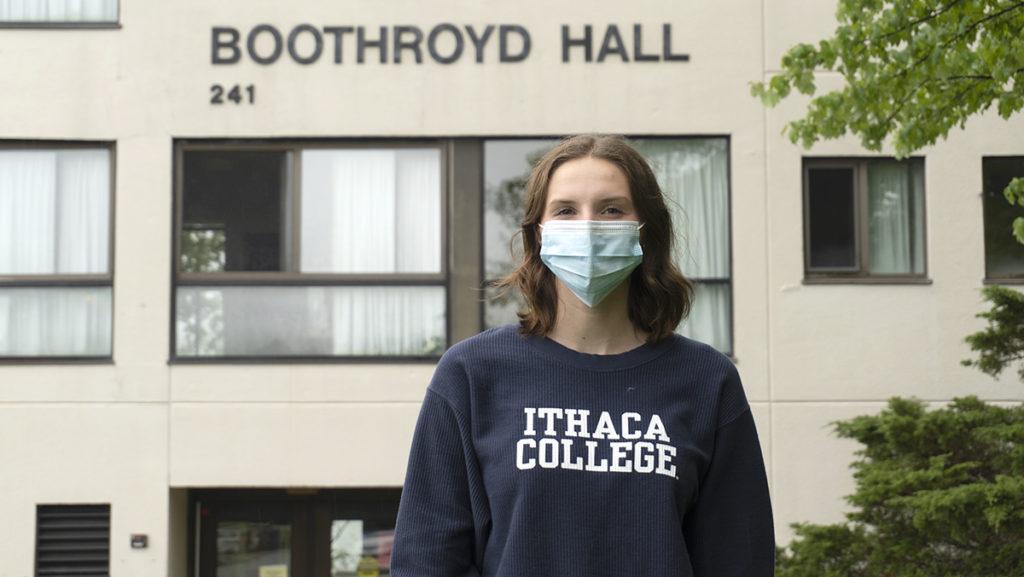Some Ithaca College students have expressed concern about witnessing their peers not following the college’s COVID-19 guidelines.
Eileen Harrington Roth, off-campus community living coordinator, held three De-escalating COVID-19 Situations meetings for students, faculty and staff March 2, 3 and 8. The trainings focused on providing verbal and nonverbal ways of handling situations in which students may not be following the college’s COVID-19 guidelines. Some of the techniques included educating peers on the correct COVID-19 guidelines, using body language or reporting the behavior via the Community Agreement Reporting Form. However, some students have found it difficult to approach other students about following guidelines.
Harrington Roth said that at the three training sessions, there were between three and 25 people. She said she also held five specific trainings that included approximately 12–20 residential assistants in each, approximately 15 Student Health Emergency Liaisons and approximately 15 Campus Center staff members.
Senior Nicole Brokaw, who works at the Ithaca College Library, attended the training March 2. She said her supervisor encouraged her and other employees to attend the training. Brokaw said she sometimes sees students not following guidelines in areas where there are fewer library employees but generally has seen students wearing their masks in the library and sitting where they are supposed to.
“After a reminder or some sort of request, students normally will correct whatever they’re doing like put their mask on,” she said.
She said she found the training useful and it gave her some confidence to go up to students and implement verbal and nonverbal techniques learned. However, she said that as a senior, she feels like she has more confidence than a younger student employee.
“I think me, in my position, I could approach any sort of student,” she said. “I definitely feel comfortable approaching students to correct them or remind them.”
Some of the verbal tactics included telling students that they noticed they were not wearing a mask or educating them on the college’s COVID-19 guidelines. Harrington Roth said in the meeting that it is important for people to assess the situation and do the best they can while being safe. She also discussed needs-based confrontation, which is focusing on what is in people’s best interest, and feelings-based confrontation, which is appealing to people’s emotions.
“This training provides skills for peer-to-peer accountability and what to do if the issue needs to rise to reporting with our conduct office,” Harrington Roth said via email.
Other verbal tactics include empathizing with the person to show understanding that wearing a mask at all times can be difficult or not desired. Harrington Roth also emphasized the importance of thanking the person for correcting their behavior.
Sophomore Katherine Urbano said she works in the Campus Center Dining Hall and sees students not following social distancing guidelines multiple times daily. She also said students do not wear their masks correctly. She said that as an employee, she has not been explicitly told to intervene, but she has seen non-student employees speak up to students. Urbano said she has told students to follow guidelines, but sometimes they do not listen to her.
“I try my best to be like, ‘Please keep everybody safe,’ but it’s hard to do once the dining halls get busy,” she said. “We try our best if we notice it.”
Urbano said she also finds it nerve-wracking to go up to people and tell them to follow the guidelines.
“I feel like if it’s people not wearing their mask right or people bunched together, I’m putting myself at risk by putting myself forward to go near them,” Urbano said. “Even in the dining hall, it’s a risk for me to be around people and trying to get them to listen to us just asking nicely.”
Urbano said she was unaware of the training but felt like it could have been useful to give her confidence and tools to go up to students. She also said she did not receive any training from Dining Services as to how to approach these situations.
“We’ve been in this for so long, so people should just know by now to follow the guidelines,” she said. “We all understood that by coming here on campus, we’d have to follow these guidelines. We all signed the Community Agreement.”
Some students previously expressed concern over the long dining hall lines coupled with minimal social distancing seen as well as little enforcement of guidelines.
Junior Rebecca Emery said she works at the information desk in the Campus Center and has seen many students disregarding guidelines.
“Nobody’s reading the [furniture] stickers or putting furniture where it’s supposed to be,” she said. “With the furniture moving, that means people are going together in groups with their masks off.”
She said she sometimes sees people sitting in larger groups at tables only meant for one or two people and also sees people with their masks off even when they are no longer eating. The guidelines allow people to remove their masks only while actively eating. Emery said it can be difficult to go up to other students and tell them to follow the guidelines.
“I am terrified to approach people due to the fact that I do not want to get sick,” she said. “When I’m approaching someone or a group of people without masks, my chances of getting COVID are a lot higher.”
The Center for Disease Control and Prevention (CDC) recommends wearing a mask that covers the nose and mouth in public settings. When a healthy person wearing a mask interacts with someone infected with COVID-19 who is not wearing a mask, the chances of infection are higher than if both people were wearing masks.
Sophomore Rachel Paskowitz said she witnessed a group of student–athletes not following social distancing and mask-wearing guidelines in the Campus Center Dining Hall.
“They were behind me not wearing their masks; they were doing their COVID tests behind me at one point,” she said. “It was really uncomfortable. I asked them to step away from me, and they just gave me a look.”












